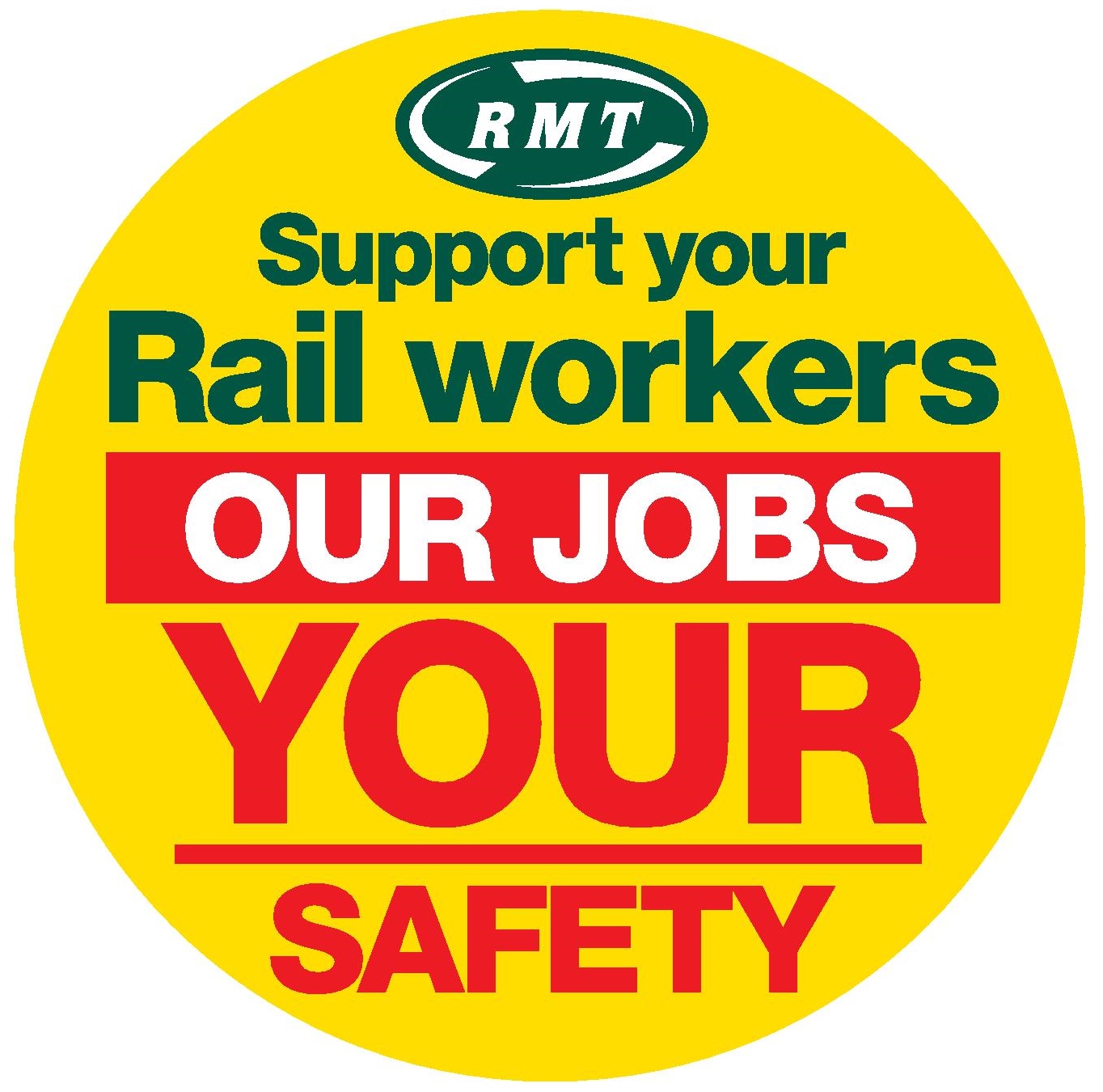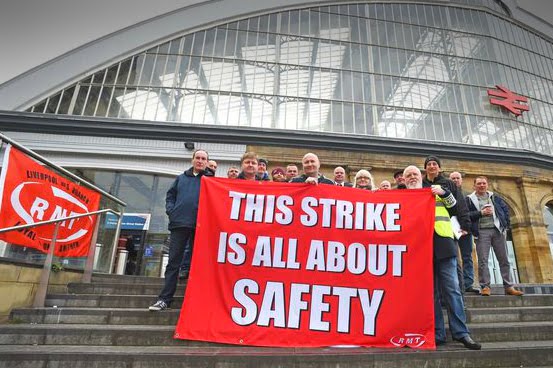Rail workers are continuing to strike on several lines in a dispute over Driver Only Operation. Across the country, picket lines remain solid.
Marxist students have been continuing their solidarity activities in support of striking rail guards on the Northern Rail franchise.
Last Saturday, activists from Newcastle Marxist Society visited the picket line at Newcastle Central Station during the latest strikes. Liverpool Marxists have also been supporting striking rail workers during this dispute. Below are reports from the pickets in Newcastle and Liverpool.
Newcastle Central station
Saturday 15th December marked the 40th day of strike action for RMT guards on Northern Rail. Although the university term has finished, a number of comrades from Newcastle Marxist society were able to make it down to the picket line at Newcastle Central station to stand in solidarity with the guards.
In spite of the inclement weather and long duration of the strike, the guards stated unequivocally that they are standing strong, maintaining high morale. They are hopeful that Arriva Rail North will return to the negotiating table to work out an acceptable deal – one where a guard is guaranteed on every train.
According to one worker who we spoke to, no more than 20 out of 1,200 guards working on Northern Rail have crossed the picket lines. This shows clearly the resolve of the guards, who are determined to win this strike.
Although disputes over Driver Only Operation have affected several lines across the country, this strike is particularly important on the Northern Rail network.
Not only do guards serve as a second safety critical member on board the train, they also assist passengers with disabilities. 85% of guards have reported that they do this on a daily basis. The Northern Rail network is particularly difficult to use for those with mobility impairments. The vast majority of stations are not step free at the platforms, and 60% of stations on the network are unstaffed.
A number of further strike dates have been announced by the RMT, in the case that Northern continues to refuse to negotiate. These will take place through to the end of the year on Saturday 22nd December and Saturday 29th December. In the New Year, strike days have also been announced for every Saturday in January: 5th, 12th, 19th, and 26th January.
Liverpool Lime Street station
 Earlier in the year, on the 31st day of strike action, Daniel Harris from the Liverpool Marxist Society caught up with one of the guards on the picket line at Liverpool Lime Street Station, who outlined the reasons behind the ongoing strike and the way forward in this fight.
Earlier in the year, on the 31st day of strike action, Daniel Harris from the Liverpool Marxist Society caught up with one of the guards on the picket line at Liverpool Lime Street Station, who outlined the reasons behind the ongoing strike and the way forward in this fight.
Daniel: Could you give us an update on the current situation in the dispute with Northern Rail? What do you see as being the barrier in bringing the strike action to an end?
RMT train guard: We’re here again, on the 31st day of action. It’s been a long time. In fact, I can’t remember when I got a full wage packet. It’s been a long time. But, as you can see from the resolve from our members, nobody is crossing our picket line. At Liverpool Lime Street, and throughout the company, the number of people that are crossing the picket line is very, very small. Perhaps surprisingly to the company, that number has never grown since day one. It’s always been the same.
So, we find ourselves on either side of a deep ravine. We’re not any closer to reaching a solution. And we believe the obstacle to reaching a solution lies fairly and squarely with the Department of Transport. Chris Grayling says that he has no influence over what happens on the railways. Quite frankly, I think that’s his job, because he’s the transport secretary and he should be influencing what’s happening on the railways. The people of this country elected his government, albeit propped up by the DUP, to run things like our public services, such as the transport infrastructure. So, when Chris Grayling says it’s got nothing to do with him, quite frankly I think its an abdication of his duty to this country.
The transport infrastructure is vital. It’s the lifeblood of this country and if he’s gonna sit there and look the other way while private franchises rip this country off without him having a brief on their activities, quite frankly, that’s not good enough. He should stand down if that’s the best that he can offer for the people in this country. He is the obstacle. He’s shoring up the private franchise holders by funding their activity against us. If the government didn’t fund the private operators and subsidise their activity in trying to beat our trade union, then this dispute would have been solved a long, long time ago.
The only reason the private operators are quite brazen in their negotiations is because they know they’re going to get paid regardless. They’ve just made an application to the government for the subsidy to offset the losses that they’ve made due to industrial action. That’s not an industrial dispute – that’s a political campaign from the Department of Transport (DfT) against workers within this industry and, in particular, our union. They say that we’re making it a political campaign. We say, it’s always been a political campaign – not from us, however, but from them.
The only way this dispute is going to be resolved is when we’re allowed to sit down with the employer and have meaningful negotiations about the subject, which doesn’t have obstacles put in place by the government. We believe that if we were able to speak to the company on a one-to-one basis, we will be able to make progress in this dispute. And, if the Department of Transport don’t want that to happen then, we’re more than willing to enter into tripartite discussions as well. If they want to influence the discussions, we’re more than willing to sit down with the government as well. We stand ready to talk with anyone for as long as it is meaningful.
Daniel: What do you think could be done in relation to local government? The Metro Mayor and the Council have been involved in the dispute locally haven’t they?
RMT train guard: In terms of local government representatives, Labour Party representatives, we’ve had a reasonable dialogue with people within the party. Not necessarily the people at the top of the local party, but we’ve been given an opportunity by the local party to put our case at various Labour Party meetings, and that’s happened since the beginning. We think that it is an example of what can happen when the politicians engage with the industrial wing of the party.
Merseyrail haven’t had a day of industrial action in a number of months. Why is that? That’s because the politicians sat down with the trade unionists and the company. They had that tripartite arrangement within this city. And whatever comes out of it, the resolution that comes out of it, is testimony to the fact that we have a tripartite arrangement. Everybody was involved in the discussions and we were able to come to a position where there is no industrial action on Merseyrail.
[Note to readers: the RMT were involved in a dispute earlier in the year in Liverpool with Merseyrail. This dispute was ended through negotiations.]
Contrast that with Christ Grayling and the DfT where they won’t engage with the people wrestling with the issue – i.e. the workforce and the company. The government’s just sitting off on the sidelines watching us deal with the consequences of it. It’s a consequence of his government’s policy which is to de-staff the railway nationwide.
A report came out a number of years ago. The main plank of that report was that the default staffing arrangements would be to de-staff stations and to take train staff off trains, i.e. guards and clerks on stations. It’s their policy that the company’s trying to implement.
We’re trying to enter into negotiations with the company. But they can’t negotiate with us because they’re being told what to do by the government and the DfT. they sit down in a room and they’ve said: “We think you’re right, but we can’t do anything about it because the government are telling us that’s not what they want.” I have been told by the negotiators that this has happened.
There’s the contrast: what can be achieved in Liverpool with the local politicians, and then what’s not being achieved on a national level.






